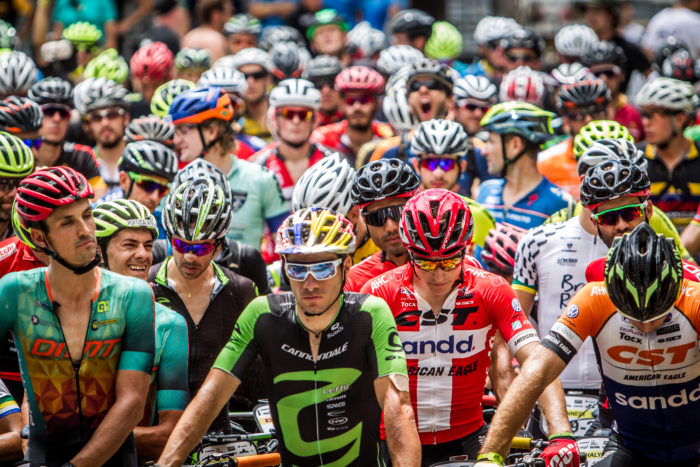Responding to popular demand, we’re publishing a new series on how to train, prepare, and race your first marathon. Not your first marathon? Read on anyway and pick up some tips we’ve put together from years of experience.
First up, here’s our best advice on how to prepare for your first marathon MTB race, including some golden rules for your training…
1. Take a good look at the marathon course
…and not just the distance. 100 kilometres is one thing, but is it 100 kilometres of singletrack? 100 kilometres of fire road? 100 kilometres with 1,000 metres of climbing will feel a lot different (and take a lot less time) than a 100-kilometre event with 2,500 metres of climbing. All the course intel you can gather will help you do the right training to minimise suffering on the day.
Maps like this one of Grand Raid, in Switzerland, will give you a lot of information about how to prepare and what systems to train to get ready for your event
Searching for an event? Take a look at our ‘best stage races for amateurs’ picks
2. Analyse your marathon event
Now that you’ve got an idea of the course, think about how long it’s going to take you to complete. Got any mates who have similar fitness to you who’ve done it before? Or maybe you’ve done a similar event, but over a different distance? Do a bit of maths and come up with how long you reasonably and realistically expect to be out on the bike.
3. Set a goal for your marathon.
You might expect to be out for five hours, but if you’ve got a couple of months to prepare, maybe you can challenge yourself to crack the five-hour mark? Setting a SMART goal (specific, measurable, achievable, realistic, time-sensitive) can help motivate you as you sacrifice your mornings and weekends to get yourself in shape for the big day.
Familiar with suffering? You might recognise the seven stages of a marathon mountain biking
4. Map your time
The ideal preparation period for a big event is eight to 12 weeks. If your event is less than four to six weeks away, you’re a little limited in how much you can encourage your body to adapt through training, but there’s still plenty that can be achieved.
Consider how much free time you have during your preparation period: how many hours on weekdays? How many hours on weekends? Be honest with yourself, too. If you need to spend time with the family, do. If you need to sleep in on Saturdays, do.
A great coach can help you prepare for the physical, technical, and mental demands of racing
5. Structure your training
Here’s where a coach (like our team’s qualified coaches Justin Morris, Ben Thomas, and Imogen Smith), or a ready-made training program available on a site like Training Peaks or Today’s Plan can come in really handy. If you’re not up for that kind of financial and emotional commitment, though, there are a few principles that can help you on your way…
MarathonMTB.com’s golden rules of training:
Train your energy systems
Remember all that course analysis you’ve done? This is where it comes in handy, especially if, like us, you’re short of time to train.
Break the course down into some of its more challenging components. Are there lots of two- to three-kilometre climbs? Lots of short, sharp pinches? Are there long, fast, flat sections? Different challenges on course will require you to ride at different intensities, drawing on different energy systems. Devote some time to developing the energy systems you’ll use in the toughest, or most decisive parts of the course and you’ll increase your chances of nailing that goal.
These efforts don’t necessarily have to be in structured interval format (although intervals are definitely effective). Get out on the trail and get competitive. Chase some Strava segments. Race your mates. Mix it up on the trail and you’ll reap the benefits while still having fun, which is always our goal.
What’s likely to be the decisive, or most difficult aspect of the course? Train the energy systems you’ll call on in times of need
Be specific
But! During a marathon you’ll mostly use your aerobic energy system, and the bigger this engine is, the longer you’ll feel good. If all else fails and you’re short of time, you want to know you can go the distance. While we think long slow rides are over-rated, it’s still important to get in a few rides of about 4 hours in before your event.
If you’re going to do these long rides, you may as well get the most bang for your buck. Specificity is always the goal, so your endurance training, like your targeted intervals, should mimic the demands of the course as much as possible. If your race has a huge amount of climbing in the second half, load some climbing into the second half of your long ride. If your race is 90 per cent singletrack—you guessed it—do as much of your long ride on singletrack as you can. The more specific your training, the easier things will go on race day.
Camelbak or bidons? Use your training rides as dress rehearsals so nothing’s left to the last minute – or worse – to chance!
Train more than your fitness
Those few longer rides are also a great opportunity to test your nutrition and hydration strategy: are you comfortable riding with a Camelbak, or will you use bidons? What electrolyte/carb sports drink mix will you use? How much will you need to eat and drink? What spares will you take? Will you eat gels or food? You can practice these things, too. The less you leave up to chance, the better your race will go, so integrate some testing into your training, so that your weekly or fortnightly endurance ride becomes a dress rehearsal for your event.
Not sure what to drink? Check out our guide to hydrating for a marathon event
Recover
Recovery is the most important, and most overlooked aspect of your training. Long rides with efforts take a toll. Schedule a few easy days after your hard or long training rides for your body to adapt and get stronger. Eat and sleep well and you’ll feel fitter in no time!
Keep your eye out for the next post in our series: prepping your gear for your first XCM

